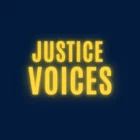
Justice Voices
Ep. 14 - Michael Tafolla
/
RSS Feed
In this part 1 of a highly instructive 2-part episode, Michael Tafolla shares the story of his life journey from living in a home with loving parents in the Little Village neighborhood of Chicago and being a nearly straight A student, to experiencing the childhood trauma of repeated victimization by gang violence even though he was not a gang member, which eventually lead him in his teenage years to make the fateful decision that to survive he would need to, as he puts it, become what he feared.
He tells how he picked up the gun and became one of the most feared gang members in his neighborhood, which set him on a path leading ultimately, only a few days after his 18th birthday, to shoot and kill a rival gang member and wound another.
He describes his lengthy prison experience, starting in maximum security, and how he came to make the dangerous decision to change his life – dangerous because of potential punishment from leaders of his gang who were in prison with him, as well as vulnerability to retaliation from members of the rival gang of his victims.
He describes how during the latter part of his incarceration in the Danville Correctional Center his participation in the in-prison Education Justice Project of the University of Illinois at Urbana-Champaign was a transformational experience for him, not only because of what he learned and the college degree he earned, but because of how he was treated as a human being and scholar.
This part 1 ends with Michael saying, “in 2018, when I was released, is when the next chapter of my life starts.”
You won’t want to miss hearing the rest of the story in part 2, the most important part, about who Michael is and what he is doing today.
In part 2, Michael shares the experience and challenges he faced upon release from prison, including barriers due to his status as a convicted felon, and how he became a victim advocate responding to the scenes of shootings to assist victims and their families deal with the trauma of gun violence.
He will discuss his work as a restorative justice practitioner as he and host David Risley dive into the topic of restorative justice and other ways in which our current approach to crime and criminal justice can and should be improved to be more effective and responsive to the needs victims, perpetrators of harm, and communities.
So, be sure to listen to both parts 1 and 2 for Michael Tafolla’s story and his deep insights gained from his own lived experience, higher education, and professional experience and observation.



